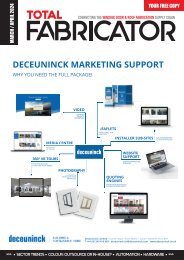June/July 2020
Create successful ePaper yourself
Turn your PDF publications into a flip-book with our unique Google optimized e-Paper software.
Health & Safety
ADJUSTING TO THE NEW NORMAL
In the space of just a few months, social distancing has suddenly become the ‘new normal’
across the UK economy. Ken Wilson, of Caldwell, offers his advice on implementing it in the
glazing sector.
In May, the coronavirus lockdown was finally
eased after two months of virtual shutdown.
In the weeks since, millions of people have
returned to work – tens of thousands of them in
glass and glazing.
But it’s certainly not been back to business as
usual. Social distancing has become a strange
but critical part of everyday working life.
We know that for many firms, it’s been a
headache to implement – but it’s also been
hugely necessary to keep staff, suppliers,
customers, and vulnerable people in communities
around the country safe.
It’s unlikely to be a short-term arrangement, too.
Realistically, social distancing will be around
for as long as it takes to develop a coronavirus
vaccine, or some other form of treatment.
“Employees need to
regularly wash their
hands with soap and
warm water for at least
20 seconds”
So with that in mind, here are a few tips we hope
will help keep fenestration workers safe in the
weeks and months ahead.
The basics
By now, I’m sure we’re all familiar with the
basics, but they’re extremely important.
Wherever possible, at the time of writing , staff need to
keep at least two metres away from each other. That
might mean you need to start up again on a smaller
scale, allowing more room between workstations.
Employees need to regularly wash their hands
with soap and warm water for at least 20
seconds – ideally, when they arrive at work, at
the start and end of every break, and before they
leave to go home. Make sure you’ve got extra
soap or hand sanitiser (if you can find some) to
cope with the extra demand.
If possible, have your premises cleaned more
regularly – focusing in particular on communal
areas like kitchens, bathrooms, and equipment
used by multiple people.
If someone in an employee’s household has
coronavirus symptoms, they obviously shouldn’t
come to work.
Keep mixing to a minimum
In a workplace like a factory or a warehouse,
some mixing is unavoidable. However, there are
steps you can take to reduce the risk.
14 T F JUNE/JULY 2020 CONNECTING THE WINDOW, DOOR & ROOF FABRICATION SUPPLY CHAIN

















